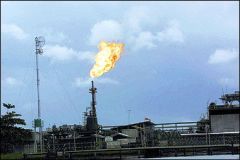African oil producers to discuss pollution risks, reform
ALGIERS, Feb 14 (AFP) — The prevention and management of pollution and the use of revenues to promote the development of their countries will be on the agenda of a conference of African oil producers this week, officials said.

|
|
Gas flaring at an oil terminal of Eguatu, Warri-South, Niger Delta. (AFP). |
Ministers and other officials of the 12-member African Petroleum Producers’ Association (APPA) meeting in Algiers for two days from Wednesday will also swap ideas on opening up the sector to foreign companies, following major moves in this direction from Algeria and Libya.
Although the APPA was founded in 1987, this is only its second congress, the first having taken place in Libya two years ago. A parallel exhibition of technologies, products and services in the industry by some 200 firms opened here Monday.
The APPA groups Algeria, Angola, Benin, Cameroon, Congo, Democratic Republic of Congo, Egypt, Equatorial Guinea, Gabon, Ivory Coast, Libya and Nigeria, but representatives of newer or prospective producers Chad, Mauritania, Sao Tome and Principe and Sudan will also attend.
With more African countries coming on line and production increasing over the next few years, the risks of coastal, maritime and other pollution are growing, according to Algeria’s Oil Minister Chakib Khelil.
In 2003 APPA countries alone produced eight million barrels of oil a day, while their proven reserves are estimated at 98 billion barrels.
Mauritania will begin exporting later this year, while the island state of Sao Tome is thought to have huge offshore reserves which could be exploited within three to four years.
Speakers at the first session of the conference will concentrate on the risks and management of coastal pollution, including plans to create an international organisation to tackle incidents the moment they occur.
Later in the conference, related problems of reducing or managing the production of greenhouse gases will also be debated, including the storing of carbon dioxide and strategies to minimise the flaring of gas.
Also on the agenda is the politically sensitive question of using oil revenues in financing social and economic development on a continent where in many cases oil wealth has benefitted a ruling elite and foreign companies rather than the general population.
Nigeria is Africa’s largest oil producer and the world’s sixth biggest oil exporter, but as world oil prices soar 75 percent of the population lives on less than one dollar per day.
In Equatorial Guinea, sub-Saharan Africa’s third largest oil producer, there has been little improvement in living standards of the half million inhabitants, who have been ruled since independence from Spain in 1968 by the same family.
Chad, on the other hand, has accused foreign oil companies of breaking agreements drawn up with the blessing of the World Bank to ensure fair distribution of wealth, something they deny.
Algeria, meanwhile, which takes 96 percent of its revenue from hydrocarbons, is planning to let foreign firms prospect for new oil and gas, ending the monopoly of the state-owned Sonatrach in this field.
The changes, which could give the companies up to 70 percent of new discoveries, last week won the support of the powerful trade unions after official assurances that Sonatrach would not be privatised.
Algeria, which in the last decade allowed foreign participation in the extraction of oil, is further relaxing a system dating back to the days of one party rule with its eyes on entering the Word Trade Organisation and forming links with the European Union.
It is following in the steps of Libya, which has just allocated the first exploration licences to foreigners for 40 years, bringing US companies back in force to Libya after years of animosity between Tripoli and Washington.
